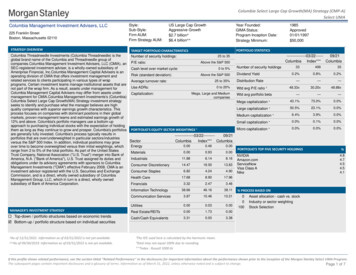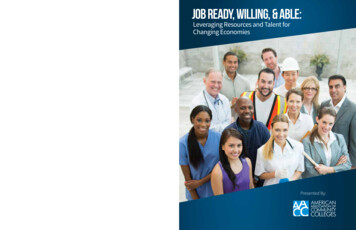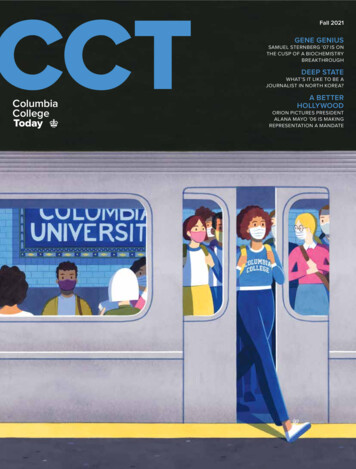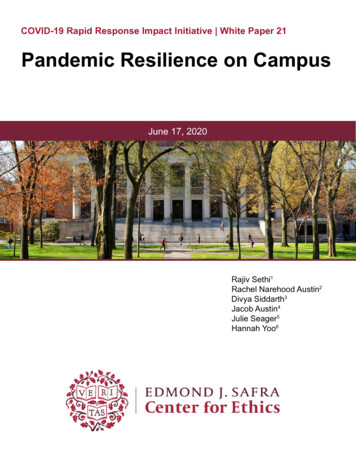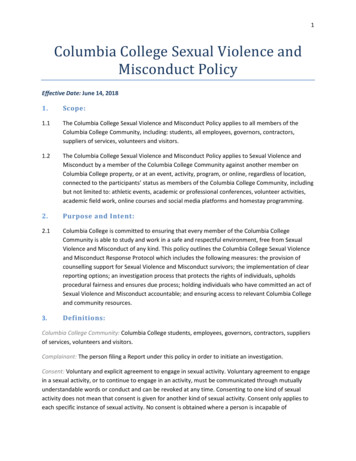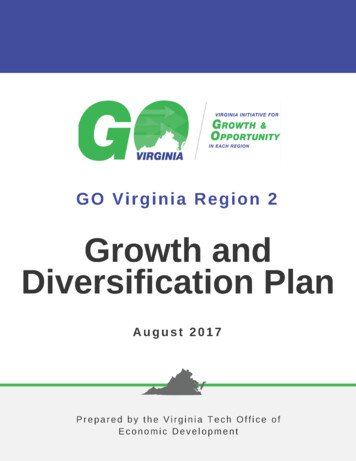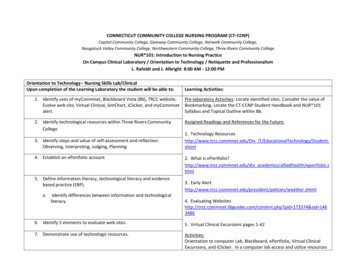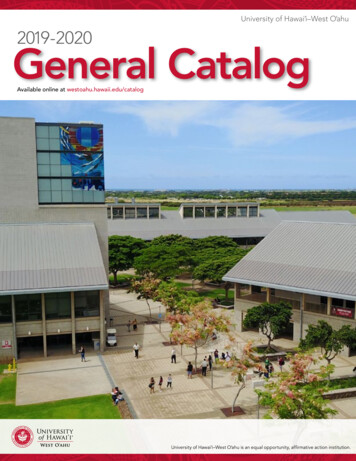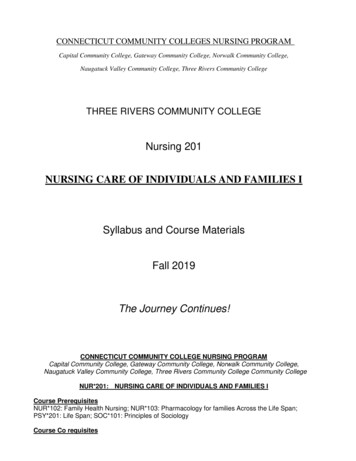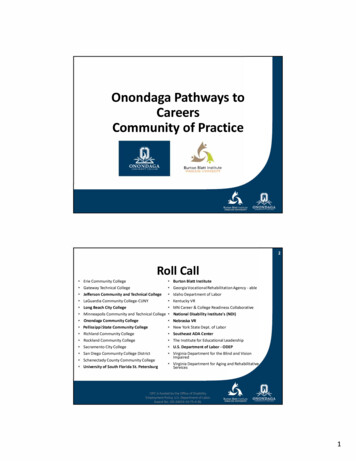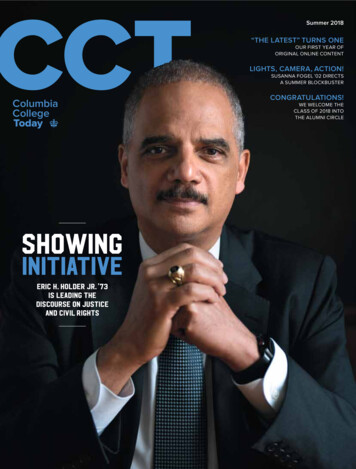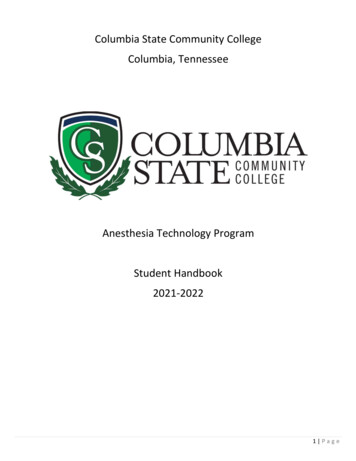
Transcription
Columbia State Community CollegeColumbia, TennesseeAnesthesia Technology ProgramStudent Handbook2021‐20221 Page
WELCOMEWelcome to the Anesthesia Technology Program at Columbia State Community College. This handbook will helpyou become familiar with the guidelines, policies and procedures related to you as a student within the AnesthesiaTechnology Program.A copy of this manual shall be distributed to every student enrolled in the Anesthesia Technology Program,members of the faculty, program medical advisor, clinical education settings, members of the advisory committeeand appropriate sponsoring institution administrators. A copy of the Anesthesia Technology Program StudentHandbook is available online at nces/A copy of the Columbia State Community College Student Handbook is available online ndbook.Each course syllabus is considered an extension and elaboration of this policy manual and may supersede policies inthis manual, where applicable.Each student shall be provided information on how to access the above documents or provided a paper copy andindicate knowledge of and intent to comply with all program policies through their signature on agreement formslocated throughout the anesthesia technology handbook. These agreement forms are filed in the program facultyoffices.The policies contained in this document have been reviewed and are supported by the Anesthesia TechnologyAdvisory Committee.It should be noted that the program policies in this handbook are an extension of the guidelines in the CollegeStudent Handbook and are subject to change. We look forward to working with you for a successful journey in theAnesthesia Technology Program!Sue Christian, B.S., Cer.A.T.T.Anesthesia Technology Program Director2 Page
Table of ContentsWelcomeColumbia State MissionColumbia State ATP MissionColumbia State ATP Approval & AccreditationColumbia State ATP Program Faculty & StaffClinical Coordinators/Site PreceptorsAcademic Support ServicesTuition Fees & Program CostsATP Academic Degree PlanATP Course DescriptionsATP Required TextbooksLibrary & Learning ResourcesStudent Support Services/Grievance ProceduresApplying to Anesthesia Technology ProgramATP Admission ProceduresATP Admission RequirementsATP Self-AssessmentAmericans with Disabilities ActATP Continuation RequirementsATP Readmission RequirementsATP Program PoliciesEmployment policyExposure to RadiationExposure to Radiation (Pregnancy)MRI SafetyWaste Anesthesia GasHazard CommunicationInfection Control –Clinical RotationsNeedle Stick Injury/Splash ExposureReporting AccidentsAttendanceInstructor AbsenceInclement WeatherStudent Health PolicyClassroom InstructionClinical Absence/TardiesClinical Hours/AssignmentsBCLS & ACLSOther Clinical PoliciesHealth RequirementsCriminal Background Check & Drug ScreenProcedures for Clinical EvaluationsClinical ObjectivesStudent Behavior – ClinicalCriteria for DismissalDisciplinary ActionStudent Records/Student PlacementColumbia State ATP Advisory CommitteeStudent Conduct & Health Sciences ProgramsSignature PagesEssential Functions AcknowledgmentCriminal Background Check/Drug ScreenConfidentiality AgreementBloodborne Pathogen TrainingStudent Release of InformationColumbia State ATP Signature FormPage 2Page 4Page 5Page 6Page 7Page 8Page 9Page 10-11Page 12Page 13-14Page 14Page 15-16Page 16-17Page 18-19Page 20-22Page 23Page 24Page 24Page 25-26Page 27Page 27- 54Page 27Page 27-28Page 28-29Page 29Page 29-30Page 30Page 30-31Page 32Page 32Page 32-34Page 34Page 34Page 34-35Page 35Page 35-36Page 36Page 37Page 37Page 37Page 37Page 39Page 39Page 40-42Page 43Page 44Page 45Page 45Page 46-47Page 49-54Page 49Page 50Page 51Page 52Page 53Page 543 Page
Columbia State Community CollegeStatement of MissionColumbia State Community College enhances the lives of citizens and the communities of southern middleTennessee through teaching, learning and student success.Columbia State Community College nurtures success, and positively changes lives through teaching, learning, andservice.AccreditationColumbia State Community College is accredited by the Southern Association of Colleges and Schools Commissionon Colleges (SACSCOC) to award the Associate degree. Questions regarding the accreditation of Columbia StateCommunity College may be directed to: Southern Association of Colleges and Schools Commission onColleges, 1866 Southern Lane, Decatur, Georgia 30033‐4097 or (404) 679‐4500 or www.sacscoc.org.Equal OpportunityColumbia State hereby reaffirms the policy of the Tennessee Board of Regents that Columbia State Community Collegedoes not discriminate against students, employees, or applicants for admission or employment on the basis of race,color, religion, creed, national origin, sex, sexual orientation, gender identity/expression, disability, age, status as aprotected veteran, genetic information, or any other legally protected class with respect to all employment, programs,and activities sponsored by Columbia State Community College. Inquiries or complaints should be directed to theDirector of Human Resources, Room 116, Pryor Administration Building, 1665 Hampshire Pike, Columbia, TN38401; Telephone (931) 540-2521.4 Page
Columbia State Anesthesia Technology ProgramMission StatementThe mission of the Columbia State Community College Anesthesia Technology Program is to graduateknowledgeable, skilled and competent professionals who will enter the workforce and positively affect healthcareand raise the standards of patient care by providing a safe anesthetic environment.Vision StatementWe are committed to providing a dynamic and challenging learning environment which reflects academicexcellence and professional integrity.Columbia State Anesthesia Technology Program ObjectivesThe Columbia State Anesthesia Technology Program prepares entry level Anesthesia Technologists in the cognitive,psychomotor and affective domains to provide high quality health care to the community.Columbia State Learning Domains and Entry Level EducationThe objective of the Columbia State Community College Anesthesia Technology curriculum is to provide thepreparation necessary to be an integral member of the anesthesia patient care team. Emphasis is on fundamental andadvanced clinical procedures to assist licensed anesthesia providers in the acquisition, preparation and application ofvarious types of equipment required for the delivery of anesthesia care. Job responsibilities may include equipmentmaintenance and servicing such as cleaning, sterilizing, assembling, calibrating, testing, troubleshooting, andrecording of inspections and maintenance.Anesthesia Technologists may work in a variety of clinical settings such as hospital operating rooms, interventionaland diagnostic radiology, post anesthesia care units, intensive care units, cardiac catheterization laboratories,emergency rooms, endoscopy suites, dental suites, and ambulatory surgery centers.5 Page
Program Approval and AccreditationThe overall goal of the Anesthesia Technology program curriculum is to prepare the student for eligibility to takeand pass the written American Society of Anesthesia Technologists & Technologist (ASATT) National CertificationExamination to become certified as an Anesthesia Technologist (Cer.A.T.T.) An Associate of Applied Science(A.A.S.) degree is awarded upon successful completion of the Anesthesia Technology curriculum.The course of study involves a curriculum that is approved and implemented in accordance withrequirements set forth by:The American Society of Anesthesia Technologists and Technicians (ASATT)7044 South 13th StreetOak Creek, WI 53154-1429The Commission on Accreditation of Allied Health Education Programs (CAAHEP)25400 US Highway 19 NorthSuite 158Clearwater, FL 33763Program AccreditationThe Columbia State Anesthesia Technology Program is in the process of applying for accreditation with the:Commission on Accreditation of Allied Health Education Programs25400 US Highway 19 NorthSuite 158Clearwater, FL 33763Phone: 626.564.3018Email: theresa@caahep.orgUpon completion of this two-year associate degree program in anesthesia technology, you'll be qualified to sit forthe National Certification Examination (NCE) for the Anesthesia Technologist administered by AppliedMeasurement Professionals, Inc. (AMP) for the American Society of Anesthesia Technicians and Technologists(ASATT). AMP is contracted by the ASATT to assist in the development, administration, scoring, and analysis ofits National Certification Examination.Columbia State Community College is accredited by:The Southern Association of Colleges and Schools Commission on Colleges1866 Southern LaneDecatur, GA 30033-4097(404) 679-4500www.sacscoc.orgColumbia State Community College is accredited by the Commission on Colleges of the Southern Association of Colleges and Schools to award theAssociate degree, Questions about the accreditation of Columbia State Community College may be directed in writing to the Southern Association ofColleges and Schools Commission on Colleges, 1866 Southern Lane, Decatur, Georgia 30033-4097 by calling (404) 679-4500, or by using informationavailable on SACSCOC’s web site (www.sacscoc.org).6 Page
Program Faculty & StaffProgram DirectorSue Christian, B.S., Cer.A.T.T.Office: Franklin FHUM-224Phone: 615.465.5720schristian@columbiastate.eduHealth Sciences Division OfficeWalter Building, Room 112Columbia te.eduDean, Health SciencesKae Brock Fleming, Ed.D., R.T. (R)Office: Walter 112Phone: atrina WoodyOffice: Columbia WRWB-112Phone: 931.540.2599kwoody2@columbiastate.eduEbony PriceOffice: Columbia WRWB-112Phone: 931.540.2600eprice@columbiastate.eduWilliamson County Campus Front DeskOffice: Franklin FSCIPhone: 615.790.4412Admissions & Records ClerkJessica JettOffice: Columbia WRWB-115Phone: t Weather LineColumbia State (All campuses)931.540.2515Clinical Coordinators/Site Preceptors7 Page
VA Tennessee Valley Healthcare SystemMarquis Patton, Cer.A.T.Ann Walia, MDAMonroe J. Carell Jr. Children’s Hospital at VanderbiltGwen Stafford, Cer. A.T.Marti Milliken, Cer.A.T.Amanda Dickert, MS, CRNALaura Payne, CRNA, MSBrian Emerson, MDVanderbilt University Medical CenterTonia R. Rozell, Cer. A.T.T.Julie Kapelan, Cer.A.T.T.Academic Support Services Available for Students8 Page
ancial AidDisabilityServices andWellnessTestingServicesAccess &DiversitySERVICES PROVIDEDCounseling by professionally trained counselors is available to students through the Student SuccessCounseling program. The Student Success Counseling program offers students assistance with educationalplanning and personal problems in an environment of confidentiality. Students also have access to PeerCounseling through the Student Success Counseling program.All students have an assigned faculty advisor. Refer to: http://www.columbiastate.edu/advising-services forquestions related to advising prior to selection of major or admission into the Anesthesia Technology.Anesthesia Technology and pre-Anesthesia Tech students are assigned to an anesthesia tech faculty advisor.The advisor is available in person, via email, or by telephone. Anesthesia Technology faculty individuallyassist Anesthesia Tech students with information about academic and program requirements, academicplanning and scheduling, course registration, filing for intent to graduate, and post AAS education.Students have access to Career Services for a variety of services and resources related to career planning orjob search. Through Career Services, students have access to the latest technology and information tools.From every campus, students can access the Internet and utilize other printed media for their career planningand job search needs. With over 150 current books and access to 200 plus Web sites, students have easyreference to an infinite amount of career information. Career services presentations are provided at eachcampus regularly. The Strong Interest Inventory, the MBTI, and the Discover programs are all availableonline to students from any campus location. Students are also provided individual assistance with thefollowing and other issues upon request: Choosing/changing a major Developing a career plan Job-search planning Resume writing Interviewing Networking Utilizing the Internet for career planning and job search Salary and employment projectionsThe financial aid program is designed to assist students who would find it difficult or impossible to attendColumbia State without financial assistance. The college offers a comprehensive program of financial aid inthe form of scholarships, part-time employment on campus, grants, loans, and veteran’s benefits. ColumbiaState places major emphasis upon financial need, academic achievement, character, and promise of futuresuccess.Information regarding who should apply for financial aid, the application process and types of financial aidcan be obtained in the Financial Aid Office, or in the administrative offices at any of the Columbia Stateextended campuses.The Disability Services Office provides plans and facilitates reasonable individualized accommodationsenabling qualified disabled students to participate and realize their goals. Information regarding contactingthe Disability Services Office is located in the College Catalog and Student Handbook, the AnesthesiaTechnology Student Handbook, and each Anesthesia Tech course syllabus. Students needingaccommodations must contact the Disability Services Office and provide official documentation. Provisionsare made in a variety of ways including tutoring, special testing arrangements, and classroomaccommodations.The Testing Services Office is responsible for the administration of the ACT, Accuplacer, and various othertests which are used to assist students in planning their program of study. Testing Services also providesproctoring services to support Distance Education, the Regents Online Degree Program, and ADA proctoringneeds.Additionally, Columbia State is an official testing center for high school equivalency testing. Persons whohave not received a high school diploma and wish to apply for a certificate of equivalency may take theequivalency exam.The Office of Access & Diversity is involved in the recruitment, retention and graduation of ethnic minoritystudents and other under-represented groups. Functions of the office include outreach efforts, meetingstudents, monitoring student progress, serving as liaison with other campus services, and developing andcoordinating activities related to minority issues. Contact information is listed the College Catalog andStudent Handbook.9 Page
Tuition, Fees, and Related Program CostsThe Anesthesia Technology Program shall charge no fees or cause the student to incur any costsexcept those specifically designated in the college catalog or in the estimated cost sheet for ATPstudents, (see next page of this ATP student handbook).The college shall assess and collect prevailing rates for tuition and application (refer to the collegecatalog and current semester schedule).The program faculty shall also review the estimated costs specific to ATP for the purpose ofmaintaining reasonable fees. The student is responsible for all costs incurred relative to travel toand from clinical assignments, uniforms, name tag, supplies, textbooks and parking. Transportationto and from the clinical assignment is the sole responsibility of the student. Columbia State doesnot assume liability for personal injury or property damage incurred while en-route to and fromthese facilities and while in the facilities.Malpractice insurance coverage is included with tuition fees.Evidence of health insurance is required for students to participate in clinical activities.Policies governing student withdrawal and refunds of tuition, fees, etc. shall be consistent withthose of Columbia State Community College (reference college catalog, and/or each semesterschedule).10 P a g e
Estimated Anesthesia TechnologyProgram Fee List (subject tochange)Application FeeTuition – Instate approximately 164.00 per semester credit hour (estimated),for 4 semesters; based on 69 credit hours; subject toincrease depending on legislation action &appropriations.Health Science Academic Course Fee 25 per semester hour ( 25 x 39 ANES credithours)Access fee for four semesters ( 10 per semester)Activity fee per semester for four semestersTechnology access fee 112.50 per semester(estimated) for four semestersFacilities Fee ( 22 per semester) 10.00 10,720.00 975.00 40.00 12.00 450.00 88.00The above fees are based upon the FALL 2018 semesterAdditional Fees for ATP StudentsMalpractice Insurance 20 per yearDosimeter (Radiation Monitoring)Physical examination (pre-admission)*Books/Supplies/patches/protective eyewearScrubs (navy blue)CPR Course (pre-admission)Criminal Background Check and 10 panelDrug/Alcohol ScreenB (required)My Record Tracker through Truescreen Annual Fee – this MUST be maintainedthroughout programASATT Student MembershipASATT National Certification ExamFinger Print & Background CheckSchool pin (optional)Advanced Cardiac Life Support (ACLS) 40.00 80.00 300.00 1,300.00 300.00 50.00Approximately 140 17.50 7.50 per year 70.00 350.00 56.00 40.00- 200.00Est. 150.00Travel expensesCFees are subject to change without notice.ABCVariableRepresents average costs.Criminal background checks and drug screens are requirements for attending clinical sites. Based on the resultsof the criminal background check and drug screen results, the clinical site may refuse to allow your presence attheir facility. This could result in your inability to successfully complete the requirements of a clinicalanesthesia technology course, and therefore, would not be able to meet the requirements of the nursingprogram. More information is available from the Anesthesia Technology Program Director.Transportation to and from clinical agencies including parking fees will be the responsibility of the student. Travelto clinical facilities outside the campus/center area will be required. Columbia State does not assume liability forpersonal injury or property damage incurred while on route to and from these facilities and while in these facilities.*Required equipment includes bandage scissors, medical full frame protective eyewear (meet ANSI Z87.1 standards) andSharpie.(Approx. 90 days, average of 60 miles/day at a cost of 0.25/mile): 1,350.11 P a g e
Program of StudyAnesthesia Technology Program (Associate of Applied Science Degree, A.A.S.)Graduates of the program will be able to:1.2.3.4.Demonstrate the ability to comprehend, apply and evaluate clinical information to effectively collaborate with the AnesthesiaCare Team.Demonstrate entry-level competency in cognitive (knowledge), psychomotor (skills), and affective (behavior) learning domains.Demonstrate professional behaviors consistent with stakeholder expectations of an Anesthesia Technologist.Possess the necessary knowledge for first-attempt success on the national technologist credentialing examination.Students gain anesthesia technology experience in clinical facilities at area hospitals throughout the community. The length of the programis five academic semesters.Academic/Degree Plan (effective 2018)Prerequisites: BIOL 2010, 2020 Human Anatomy & Physiology I & II; CHEM 1010Course Rubric and Numberrecommended each semesterFirst Year – Fall *ENGL 1010BIOL 2010MATH 1130 or 1530ADMN 1306HUM/FACOLS 101First Year – SpringANES 1001BIOL 2020CHEM 1010 or 1110PSYC 1030COMM 2025 or COMM 2055First Year – SummerANES 1401ANES 1402ANES-1110Second Year – FallANES 2401ANES 2402ANES-2420ANES-2405Second Year – SpringANES 2250ANES 2430Course TitleCredit HoursComposition IAnatomy & Physiology ICollege Algebra or Elementary StatisticsMedical TerminologyApproved Humanities/Fine ArtsColumbia State College SuccessTotal Credit hours34333117Intro to Anesthesia TechnologyAnatomy & Physiology IIIntro to/General Chemistry IGeneral PsychologyFundamentals of Communication or Argumentation andDebateTotal Credit hours1443315Basic Principles of Anesthesia TechnologyBasic Principles of Anesthesia EquipmentAnesthesia Tech. Clinical 1Total Credit hours4419Adv. Principles of Anesthesia TechnologyAdv. Anesthesia EquipmentAnesthesia Tech. Clinical 2Anesthesia PharmacologyTotal Credit hours444416Prof Issues for the Anesthesia TechnologyAnesthesia Technician Clinical 3ANES 2440Anesthesia Technician Clinical 4ANES 2290Anesthesia Technician CapstoneTotal Credit hoursTotal Credit Hours for Program24421269Note * - Based on the institutional placement process, some students may be required to take Learning Support courses whichare pre-requisites to some general education courses and may extend the overall timeline.12 P a g e
Course DescriptionsANES – 1001 – Introduction to Anesthesia TechnologyThe course is a general introduction to the role of the Anesthesia Technologist, professional expectations, andpractice standards.ANES-1401 – Basic Principles of Anesthesia TechnologyThe course is an introduction to anesthesiology's contribution to quality patient care and the relationship of theanesthesia technician to other healthcare professionals. The focus is on patient safety, universal precautions andemployee safety in the healthcare environment. An introduction to the theory and concepts of a surgicalenvironment is given including the fundamentals of a variety of anesthesia equipment and basic case set-up utilizinganesthesia supplies.ANES-1402 – Basic Principles of Anesthesia EquipmentThis course offers an introduction to the theories and concepts in the adequate function of anesthesia equipmentincluding maintaining equipment, repairing defects and trouble-shooting complications. The student will beintroduced to basic equipment used for patients while undergoing anesthesia, including airway equipment andhemodynamic monitoring. Introduction to point-of-care testing (POCT) will also be covered.ANES-1110 – Anesthesia Technology Clinical 1 (45 Hours)This course provides the student an experience in direct observation in the health care setting with a focus onanesthesia technology. Emphasis is placed on beginning professional skills development of an anesthesia technician.This course is graded on a pass/fail basis.ANES 2401- Advanced Principles of Anesthesia TechnologyThis course covers the theory and concepts of the use and function of anesthesia supplies and equipment used forvarious surgical procedures to include studies in general, regional and conscious sedations as well as patientpositioning. Additional topics are types of anesthesia emergencies, including difficult airways, malignanthyperthermia, hemorrhage and cardiac arrest.ANES 2402 – Advanced Anesthesia EquipmentThis course provides instruction and lab application to the theories and concepts of advanced anesthesia equipmentthat are used in complex anesthesia/surgical situations. Topics include invasive monitoring and high-levelequipment: thromboelastograph, cell saver, transducers and transesophageal echocardiogram to properly assist withcare of a high-risk patient.ANES-2420 - Anesthesia Technology Clinical 2 (180 Hours)This clinical experience provides the student with the opportunity to observe and practice the principles of infectioncontrol in a surgical setting as well as gain experience with specific anesthesia equipment. The student will observe,obtain and practice specific technical skills. Hands-on experience will provide technical skills and furtherunderstanding of the theories taught within the classroom. This course is graded on a pass/fail basis.ANES-2405 – Anesthesia PharmacologyThis course covers the theory and concepts in the proper use and safe practice of delivery and storage of anesthesiamedications. Drugs commonly used in the practice of anesthesia will be studied. Emphasis is placed on the properidentification of these drugs by trade and generic names, their basic pharmacological action, and how they are usedin the clinical setting.13 P a g e
ANES-2250 – Professional Issues for the Anesthesia TechnicianThis course surveys the current trends in anesthesia technology. Emphasis is placed on professional issues such ascontinuing education, ethical behavior, team functioning and organization of health care institutions.ANES-2430 – Anesthesia Technology Clinical 3 (180 Hours)This clinical course takes place in diverse health care settings. The clinical experiences will provide the student withthe opportunity to observe and practice the entry level skills with specific anesthesia equipment. The student willobserve, obtain and practice at an entry skill level. Hands-on experience will provide technical skills and furtherapplication of the theories taught within the classroom. These courses are graded on a pass/fail basis. (Offered infinal semester during first 7-week term)ANES – 2440 - Anesthesia Technology Clinical 4 (180 Hours)This clinical course takes place in diverse health care settings. The clinical experiences will provide the student withthe opportunity to observe and practice the entry level skills with specific anesthesia equipment. The student willobserve, obtain and practice at an entry skill level. Hands-on experience will provide technical skills and furtherapplication of the theories taught within the classroom. These courses are graded on a pass/fail basis. (Offered infinal semester during second 7-week term)ANES-2290 – Anesthesia Technology CapstoneThis course includes current topics in Anesthesia Technology, emerging trends, a review of curriculum content, andpreparation for certification examination.14 P a g e
Required TextbooksBarash, P. G. (2017). Clinical anesthesia‐8th ed. Philadelphia: Wolters Kluwer. ISBN: 978‐1‐4963‐3700‐9Davis, P. J., & Cladis, F. P. (2017). Smiths anesthesia for infants and children. St. Louis, MO: Elsevier. ISBN: 978‐0323341257Dunn, P., et al. (2007). Clinical Anesthesia Procedures of the Massachusetts General Hospital ‐ 7th ed. Philadelphia: Lippincott.ISBN: 978‐1‐4511‐9515‐6Ehrenwerth, J., Eisenkraft, J. B., & Berry, J. M. (2013). Anesthesia equipment: Principles and applications – 2ND ed.Philadelphia, PA: Elsevier Saunders. ISBN: 978‐0‐323‐11237‐6Guimaraes, E., Kirsch, J. R., Davis, M., & Woodworth, G. (2019). The anesthesia technologists manual. Philadelphia: WoltersKluwer. ISBN: 978—1‐4963‐4431‐1Jaffe, R. A., Schmiesing, C. A., & Golianu, B. (2014). Anesthesiologists manual of surgical procedures – 5TH ed. Philadelphia:Wolters Kluwer Health. ISBN: 978‐1‐4511‐7660‐5Shafer, S. L., Rathmell, J. P., Flood, P., & Stoelting, R. K. (2015). Stoeltings pharmacology and physiology in anesthetic practice– 5th ed. Philadelphia, PA: Wolters Kluwer Health. ISBN: 978‐1‐60547‐550‐9Additional reference material:ANES 2420, 2430 & 2440: Anesthesia critical care reference sheets – ALL esthesia‐critical‐care‐reference‐sheet15 P a g e
LIBRARY AND LEARNING RESOURCESAs of April 1, 2016, the Columbia State library (all locations combined) has 61,267 books (volume count) in thecollection and provides access to over 150,000 electronic books through Ebsco ebook Academic Collection, GaleVirtual Reference Library, Oxford Premium Reference Collection, Safari Tech Books, and other databases. Thelibrary subscribes to over 75 print journals and newspapers. In addition, the library subscribes or has access throughconsortial arrangements to over 90 online research databases. These electronic subscriptions provide students andfaculty with full-text access to over 30,000 journals and newspapers, plus reference materials and other researchitems. In addition, the library has 3,100 microforms and 2,700 audiovisual items, mostly DVDs and Audio.Students and faculty benefit from academic online resources available via consortia arrangements and purchases.They have access to academic materials that would have been available only in university libraries before the adventof the Internet. Students in campus classes, in all programs at all locations, and in online classes have 24/7 access tothese resources. Consortia that provide cost-effective access to licensed online resources are Tennessee ElectronicLibrary (TEL), a virtual library funded by the Tennessee Legislature which provides additional online databases;Tenn-Share (300 libraries of all types in Tennessee) which provides additional online databases; Tennessee Board ofRegents (TBR) Media Consortium which provides additional online videos; and TBR Campus Collaborative /Regents’ Online Degree Program (RODP) Virtual Library which provides additional online databases and streamingvideos. Consortia that enable students to access materials in other libraries are Tennessee Academic LibraryCollaborative (TALC), which facilitates access to library materials at all TBR/UT colleges, and the OnlineComputer Library Center (OCLC), an international library consortium which provides access to a global librarycatalog and interlibrary loan and is the library’s primary source of acquisitions and cataloging information.Students, faculty, and staff can also obtain materials from libraries all over the country through the library’smembership in OCLC. Thus, students are not limited to materials that are available in the library or included in thelibrary’s online resources. Through interlibrary loan (ILL) the library can borrow books, documents, and journalsfrom any other library that is a member of the OCLC consortium. This service is heavily used by faculty working onadvanced degrees. Request forms are available at the reference desk in Columbia and at the service desks at otherlocations. Faculty and students can contact the libr
Office: Walter 112 Phone: 931.540.2595 efleming@columbiastate.edu Secretaries Katrina Woody Ebony Price Office: Columbia WRWB-112 Office: Columbia WRWB-112 Phone: 931.540.2599 Phone: 931.540.2600 kwoody2@columbiastate.edu eprice@columbiastate.edu Williamson County Campus Front Desk Office: Franklin FSCI
